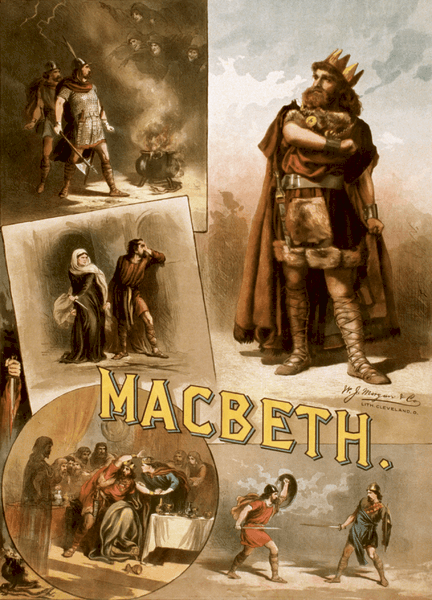Macbeth is one of Shakespeare’s most famous tragic heroes, not least because he represents the Man Who Has It All (seemingly) and yet throws it away because of his ‘vaulting ambition’ to have Even More: to be king. A brave and effective soldier who is rewarded by the King, Duncan, for quelling a rebellion against his king, Macbeth decides to kill this same king, while Duncan is a guest under Macbeth’s own roof, just so Macbeth can seize the crown for himself. What’s more, he embarks on this course of action largely because he is tempted to do so by the Three Witches (who prophesy that he will be King) and by a woman closer to home, his ruthlessly ambitious wife, Lady Macbeth, who taunts his courage and his manhood (as it were) when Macbeth seems reluctant to go through with the deed.
And here we have the nub of it: what makes Macbeth such a touchstone and archetype for the tragic hero and the evil villain. Many evil people carry out evil deeds but believe they are acting for the greater good: they may know, deep down, that individual acts they perform are evil, but they justify their execution because ‘the ends justify the means’ and they believe they are acting in the name of Something Greater. Religious fundamentalism is one example, as is much political terrorism.
As Mitchell and Webb brilliantly show in a famous comedy sketch, such figures are evil but think they are really good, on balance. Then there are the Shakespearean villains who are ‘determined to prove a villain’, as Richard III puts it in Henry VI Part 3, because they are ‘rudely stamp’d’ (Richard again)  and are shunned by society for some reason or another. Richard III is a prime example of this.
and are shunned by society for some reason or another. Richard III is a prime example of this.
Macbeth, however, is quite different. He begins the play as the golden boy, with the respect of king and country. He knows that what he is doing cannot be justified on any grounds. Unlike the source material on which Shakespeare drew for the play, Macbeth cannot justify the murder of Duncan on the grounds that Duncan is a weak ruler (he isn’t) or that Duncan has overlooked Macbeth in favour of awarding his own son, Malcolm, with a noble title (he hasn’t).
Quite the opposite: in fact, perversely, Duncan’s recognition of Macbeth’s service, by naming him Thane of Cawdor, only helps to convince Macbeth that he should murder Duncan – because in proclaiming him Thane of Cawdor, Duncan fulfils the first part of the prophecy of the Three Witches. If that part has proved true, how about the rest of it?
But this is not to say that the character of Macbeth, as Shakespeare presents him, is therefore psychologically simplistic or straightforward. Macbeth is also a jumble of contradictions: he is a brave warrior in battle, as we know from the reports of his actions on the battlefield early on in the play, and his vanquishing of the previous (corrupt) Thane of Cawdor. Yet he is also a man who recoils at the idea of killing one man in his own house, even though he wishes to do so; and only finally agrees to do it when his wife calls his manhood into question and taunts him for a perceived lack of courage.
Every deed Macbeth commits after that first one is justified by Macbeth’s desire to make his position ‘safely thus’, as he puts it in his soliloquy in III.1. He justifies having Banquo murdered and attempting to kill Fleance because Banquo, too, has been given a prophecy from the Three Witches, and seeing Macbeth’s prophecy comes true, he knows his friend will do his best to ensure Fleance and his descendants end up on the throne. As Macbeth puts it in III.2, ‘Things bad begun make strong themselves by ill.’
As we mention in our short analysis of the play’s themes, Macbeth as a character displays little remorse for what he’s done. Instead, his guilt pertains to his fear of his crimes being discovered, rather than contrition for having murdered innocent people. It’s telling that when Banquo’s ghost appears to him (and him alone), his reaction is first terror, and then anger that the game might almost be up.

